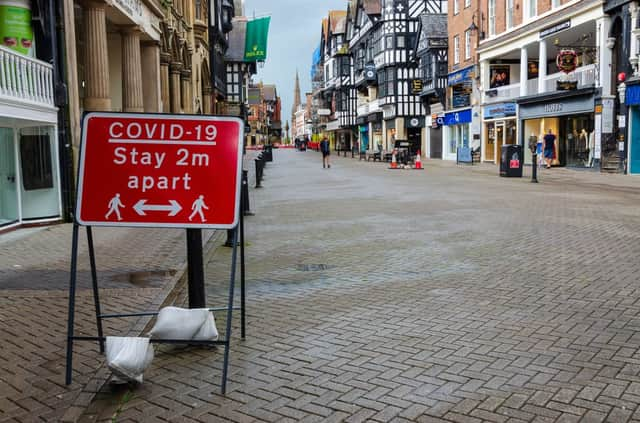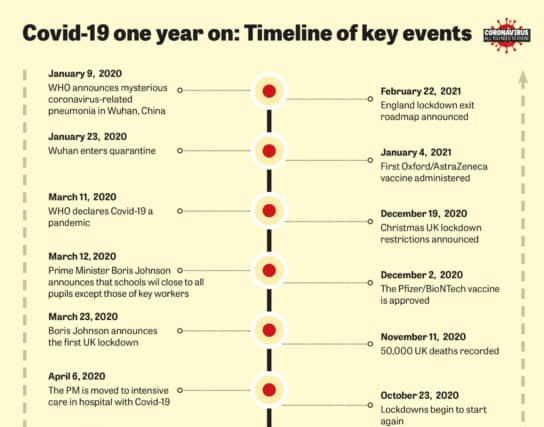Looking back at the key moments of the Covid pandemic - one year on from the UK's first lockdown


Thursday 11 March marked one year since the World Health Organisation (WHO) announced that a novel coronavirus first detected in Wuhan, China had developed into a global pandemic, and Tuesday 23 March 2021 brings with it another milestone - the anniversary of the beginning of the UK's first national lockdown.
Over the past year, the virus has infected more than 118 million people and taken over 2.6 million lives, as countries around the world battled the pandemic, bringing in unprecedented lockdown and social distancing measures.
Advertisement
Hide AdAdvertisement
Hide AdHere is a look back at some of the key moments that have shaped the last year:
9 January 2020 - WHO announces mysterious coronavirus-related pneumonia in Wuhan, China
At the start of the year, WHO released a statement regarding a cluster of pneumonia cases in Wuhan, China. The statement reported that “Chinese authorities subsequently reported that laboratory tests ruled out SARS-CoV, MERS-CoV, influenza, avian influenza, adenovirus and other common respiratory pathogens”.
23 January - Wuhan enters quarantine
Two days before, Chinese scientists confirmed that Covid-19 can be transmitted from person to person. On 23 January, the world saw the first city wide quarantine because of the virus, with the city’s population of 11 million plugged into lockdown. The move was seen as unprecedented, with 17 people dead from the virus, and over 500 infected.
11 March - WHO declares Covid-19 a pandemic
Tedros Adhanom Ghebreyesus, director general of WHO, said at a briefing in Geneva the agency was “deeply concerned by the alarming levels of spread and severity” of the outbreak. He also expressed concern about “the alarming levels of inaction.”
12 March - Boris Johnson addresses the UK
Advertisement
Hide AdAdvertisement
Hide AdBoris Johnson addressed the nation with a primetime TV broadcast address. The Prime Minister announced that schools across the UK wil close to all pupils except those of key workers. The UK Covid-19 death toll was at 104.
23 March - First UK lockdown begins
Boris Johnson announced the first UK lockdown, telling the public they will only be allowed to leave their homes for limited reasons, and banned gatherings of more than two people in public.


The furlough scheme was also announced, helping firms pay 80 per cent of the wages of staff who were unable to work because of the pandemic.
5 May - UK surpasses Italy with highest death toll
The UK went on to surpass Italy, who suffered immense losses in the first wave of the pandemic, to become the country with the highest declared death toll in Europe, recording more than 32,000 deaths.
25 May - Dominic Cummings Press Conference
Advertisement
Hide AdAdvertisement
Hide AdThe former Downing Street Chief of Staff refused to resign or apologise after breaching the lockdown. Mr Cumming's drove 264 miles from Lonodn to his parents' estate in Drugam despite suspecting that both he and his wife has coronavirus.
1 June - Lockdown measures eased
Lockdown measures in some parts of the UK eased, with school children in England returning to the classroom. Retail parks, high streets and some outdoor leisure parks opened their doors later in the month.
9 July - WHO announces Covid-19 can be airborne
WHO announced that the novel coronavirus can be transmitted through the air after more than 200 scientists sign a letter urging the agency to revise its recommendations. In an updated scientific brief, WHO notes that the virus may linger in the air in crowded indoor spaces and emphasizes that the virus may be spread by asymptomatic individuals.
21 July - Hope for vaccine grows
Hope for a successful fast produced Covid-19 vaccine continued to grow, after AstraZeneca showed promising results against Covid-19 within trials.
28 September - Global death toll surpasses 1 million
Advertisement
Hide AdAdvertisement
Hide AdThe number of deaths linked to Covid-19 worldwide crossed the one million mark, according to The New York Times, surpassing the deaths caused by HIV, dysentery, malaria, influenza, cholera, and measles combined in 2020.
October 23 - Lockdowns begin to start again
Wales commenced a two week long “firebreak” lockdown after 1,197 new cases were recorded. England followed soon after, with Boris Johnson announcing a four week lockdown in England.
11 November - 50,000 UK deaths recorded
On 11 November, the UK passed the grim milestone of becoming the first country in Europe to pass 50,000 Covid-19 related deaths.
2 December - First Covid-19 vaccine approved
The Pfizer/BioNTech vaccine was approved by the Medicines and Healthcare products Regulatory Agency, making the UK the first country in the world to approve a coronavirus vaccination.
Advertisement
Hide AdAdvertisement
Hide AdSix days later, on 8 December, 90 year old Margaret Keenan became the first recipient of a Covid-19 vaccine.
19 December - Christmas UK lockdown restrictions announced
Leaders across the UK began to announce tough restrictions across the Christmas holiday period in response to concern about a new mutation found in the South East of England. The mutation was more contagious than the former, but did not appear to be more lethal or lead to more disease.
4 January 2021 - First Oxford/AstraZeneca vaccine administered
On 4 January, Brian Pinker became the first person to receive a dose of the Oxford/AstraZeneca vaccine.
27 January - 100,000 deaths
The UK Covid death toll passed the 100,000 milestone, ONS figures showed. NHS Providers chief executive Chris Hopson described it as “a dreadful milestone to have reached”.
22 February - England lockdown exit roadmap announced
Boris Johnson revealed his roadmap to cautiously ease out of lockdown, setting the goal of all restrictions being lifted by 21 June.